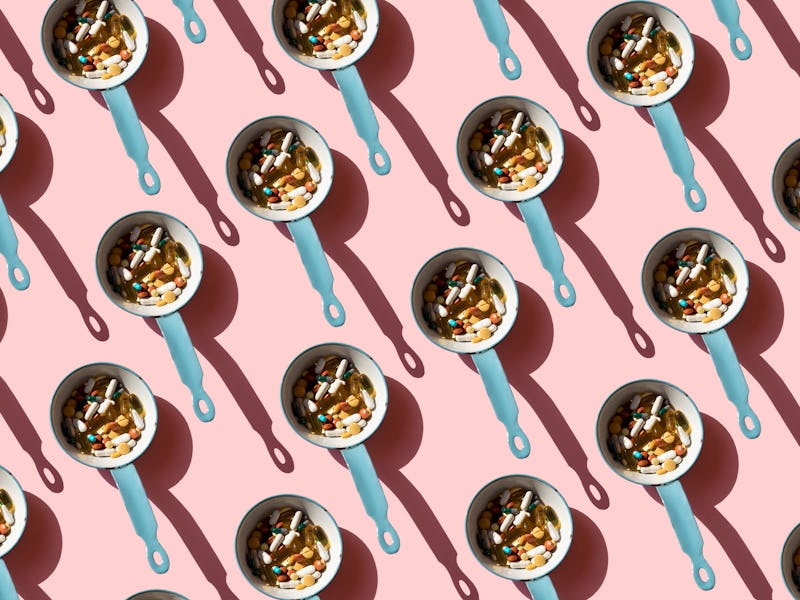The science behind probiotics: How to pick the one that works best
When it comes to choosing the right probiotic, there are a number of things to consider.

Over thousands of years of co-evolution, we have developed a way of working together with our bacteria, which play a hugely important role in our bodies. They help us synthesize vitamins and digest fiber. A growing body of evidence also suggests that they play a vital role in our health and wellbeing, too.
Imbalances in our gut bacteria can cause us to develop chronic diseases, including obesity, type 2 diabetes, and inflammatory bowel disease. These imbalances can occur when you take antibiotics, which can wipe out the healthy bacteria in your gut. It can also happen if you have a poor diet.
Imbalances in gut bacteria can even have an impact on our mental health. And, more neurotransmitters (the chemical signals that send messages between neurons, nerves, and cells) are produced in the gut than in the brain. Maintaining the balance and diversity of these organisms in the gut is vital for our wellbeing.
One of the best ways of correcting and maintaining good gut bacteria balance is to consume probiotics. Probiotics are live microorganisms that are beneficial to our gut health. They occur naturally in some fermented foods, including yogurt, sauerkraut, and sourdough bread. They can also be taken as a supplement.
Probiotics work by crowding out any potentially bad bacteria, taking up space and using up nutrients they would need to reproduce. They also help digest foods that we can’t, such as fiber and resistant starch. They produce lots of beneficial substances along the way, such as short-chain fatty acids that fuel our gut cells, helping to build the gut barrier that prevents disease-causing microorganisms from moving to other parts of the body.
Probiotics can also produce special antibiotic-like substances that kill harmful bacteria, called bacteriocins. Probiotics help to prime our immune system so our cells are ready to tackle bacterial and viral invaders.
But to get to the gut, probiotics need to go on a journey through our digestive system, which is filled with acid and bile – so they need to be hardy. They have to survive the journey not only inside us but also during the manufacture of food products or supplements, and insufficient enough numbers to make a difference to our guts. Probiotics should contain one billion to 10 billion viable organisms. And, once they’ve reached the gut, they have to be able to stick to the cells and start breaking down fiber and producing vitamins.
Choose right
When it comes to choosing the right probiotic, there are a number of things to consider. First, they have to be safe. Any organism used in probiotic supplements should have passed tests that show they are safe to consume from the European Food Safety Authority, or, in the US, be “generally recognized as safe” organisms – meaning they won’t cause harm when used as intended.
Second, a strain is important, as different bacterial strains perform different functions. Species in the Lactobacillus and Bifidobacterium categories are the most common, but they don’t all do the same thing. Lactobacillus Plantarum has potential cholesterol-lowering properties, whereas Lactobacillus reuteri is able to inhibit the growth of germs such as E coli.
These “lactic acid” bacteria can generally withstand the low pHs and high temperatures often involved in food processing, but not in all cases. Some strains of Lactobacillus paracaesi and Lactobacillus fermentum cannot survive processing.
In order to withstand the harsh conditions of processing and acid in the human gut, bacteria can be freeze-dried (lyophilised), or they may be wrapped in a resistant coating (encapsulated). Alginate made from seaweed is frequently used as a coating because it’s low-cost, non-toxic and biodegradable, and can withstand the journey to the gut.
Most probiotic foods should be kept refrigerated.
There are a large number of different probiotic supplements and strains available. Since probiotics need to be delivered to the gut to work, they are most commonly and effectively taken orally, usually in a tablet or capsule. These usually don’t need to be refrigerated as the bacteria will return to their active state in the gut. However, these should be kept away from moisture to maintain viability.
Probiotics found in food products, especially liquid or semi-solid ones such as milk or yogurt, usually need refrigeration to keep them safe. Their effectiveness can also depend on what other bacteria are in the product, oxygen content, and temperature.
So should you be adding probiotics to your diet? If you’re healthy and follow a balanced diet already, the foods you eat should provide your gut with all the fuel required to maintain a good balance. While additional probiotics can be useful in some situations – such as after finishing a course of antibiotics – they shouldn’t replace a balanced diet rich in fruits, vegetables, and fermented foods.
A person’s eating habits are a major factor in maintaining gut balance. The foods we eat can influence both the microbial populations and what these bacteria and microbes do, even from the early stages of life. Maintaining the balance and diversity of organisms in the gut is key for good, overall health.
This article was originally published on The Conversation by Janice Taylor at Glasgow Caledonian University. Read the original article here.